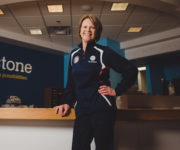Meet the Match
An Argentine Power Soccer Executive Spreads the Game
Strapping into a wheelchair for his first game of power soccer, Joaquín Carrera thought he could rely on his polo skills polo player. As lover of the equestrian sport, who often played with his four siblings as a young man in Buenos Aires, the dynamics appeared similar: both are team-based sports where players use horses or machines to maneuver around a court and score goals.
“The power soccer players were much better than me, though” Joaquín laughs. “It is a very special relationship between the player and his horse or wheelchair. You must work together, and with your teammates, if you want to win. I love both sports. They are very exciting.”
Born to a business professor at a top university, Joaquín followed in his father’s footsteps. In 2013, he graduated with a bachelor’s degree in business administration from the Catholic University of Argentina. Last year, he completed a one-year post-graduate course in management and administration of social non-governmental organizations, with plans to earn his MBA in Spain.
In his early career, Joaquín worked as a junior analyst in trade marketing for Johnson & Johnson, an executive director and advisory council member for CELAFOR (the Latin American Training Center), and as a coordinator and director various volunteer and entrepreneurial organizations. Propelled by a desire to make a bigger impact in society, he moved into the social sector after meeting Mariano Zegarelli, who founded Powerchair Football Argentina after his son was born with spinal muscular atrophy. Through a common passion for disability sport and social change, the two men became close. Zegarelli believed Joaquín could carry over his business knowledge to establish power soccer across Argentina, and hired him as executive director of Powerchair Football Argentina in 2014.
“I always believed in maintaining a balance between business and social responsibility,” Joaquín says. “Keeping this balance helps me grow internally as a person. I am happier knowing I’m giving everything for other people.”
As executive director, Joaquín desires to bring a high level of professionalism to the new sport. In his first days on the job, he learned all he could about disability. Then he reached out to rehabilitation centers, hospitals, soccer coaches and referees, creating the groundwork for a league and a national team.
“We had to bring an entirely new sport to Argentina,” Joaquín says. “In Argentina, there are many highly-qualified coaches, but few know about powerchair soccer. We had to show them the rules, teach them about disability, and work closely with other AFA and FIFA referees, in order to get off the ground.”
Progress has been significant. In the matter of a few years, the association has launched six clubs, with roughly 50 players pursuing professional and recreational tracks in four cities—Cordoba, Rosario, Buenos Aires, and Mar de Plata. As South American champions, Argentina competed at the 2017 World Cup in Florida, joined by two of the country’s referees.
According to Joaquín, there are 40,000 estimated wheelchair users in Argentina, including Vice President Gabriela Michetti and Minister of Labor Jorge Triaca. Overall, government statistics estimate more than 3 million Argentineans have some form of disability. Joaquín is convinced that sport can empower people with disabilities to become leaders across society, from business to government positions. In his time with the federation, he has seen how players develop relational, cognitive, and physical skills through sports. Many have been motivated to finish their educations and seek employment.
“Sport brings values that are very important for changing people’s mindsets,” Joaquín says. “Of course, you can create new realities for yourself and discover new horizons. You create new friendships and learn how to overcome challenges individually and with a team. But, most importantly, you show the world that disability is not a problem that needs to be fixed.”
Through participating in the U.S. Department of State Global Sports Mentoring Program, Joaquín was on a mission to learn new ways to amplify athlete recruitment, set clear benchmarks for the federation’s future success, and ultimately expand power soccer across Argentina. He spent three weeks at Turnstone Center for Children and Adults with Disabilities, one of the country’s most highly-respected and state-of-the-art rehabilitation and adaptive sports training centers. At Turnstone, he was mentored by Tina Acosta, director of program outreach, and Michelle Kimpel, director of wellness and adaptive sports—two women who have spent more than 15 years each serving with the organization. With nationally-successful power soccer club teams, and a decade of running recreational and competitive tracks for community members with disabilities, Turnstone provided Joaquín with the ideal environment and support for his long-term efforts to positively impact the lives of thousands of people with disabilities in Argentina.


